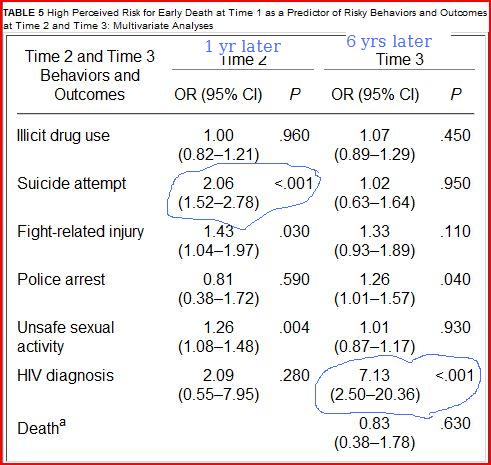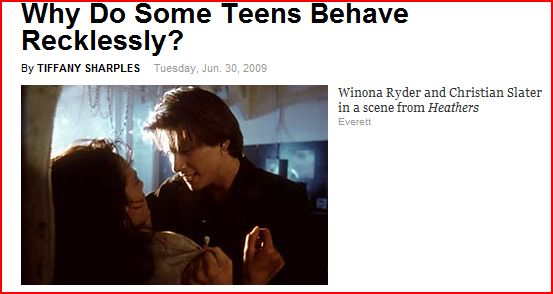July 13, 2009
A Surprising Number Of Teens Think They'll Die Young, Or Live Forever, Whichever Comes First
An unsurprising number of adults don't care either way.
CHICAGO - A surprising number of teenagers -- nearly 15 percent -- think they're going to die young, leading many to drug use, suicide attempts and other unsafe behavior, new research suggests.
The study, based on a survey of more than 20,000 kids, challenges conventional wisdom that says teens engage in risky behavior because they think they're invulnerable to harm. Instead, a sizable number of teens may take chances "because they feel hopeless and figure that not much is at stake," said study author Dr. Iris Borowsky
15% is surprising-- because it's smaller than I would have guessed, no? How many teens did you know in high school who thought they'd die by 30 (their parents' age when they were 4...?) or 33 (Jesus?)?
The really surprising thing is the logic: how do they make the jump from thinking you'll die young, to using drugs? Is it only those 15% who use drugs? Do the majority of those 15% go on to use drugs? etc.
How many teens think they will live forever? Not like vampires, but how many can't imagine their lives three years into the future, let alone 30, and this finds expression in the sentence "I'm never going to make it to 35"? It would be equally (in)valid to conclude, "teens belief that they will live forever leads to risky behaviors."
II.
Yes, I'd expect someone of my generation to say something that obtuse.Borowsky said the magnitude of kids with a negative outlook was eye-opening. Adolescence is "a time of great opportunity and for such a large minority of youth to feel like they don't have a long life ahead of them was surprising," she said.
III.
Adolescence is supposed to be an identity Schrodinger's Cat: multiple simultaneous states which eventually collapse into only one. The goal of adulthood is to let go of the other possible existences and to make the best of the one. A successful adult is one who understands that it doesn't matter which life you ultimately pick, only that you live it well. The same potential for, say, happiness exists whether you are a construction worker, porn actor, or wealthy industrialist.
Meanwhile, it is in no way contradictory for a teen to think he'll die young AND live forever; or that he'll become a chef AND be an infantry colonel; that he'll raise his kids on a farm AND roam the earth celibate like Kung Fu.
But the idea that kids are having multiple potential lives, simultaneously, doesn't sit well with adults, especially when the adult is more concerned with how the kid impacts their life, not the other way around.
IV.
As an aside:
The study suggests a new way doctors could detect kids likely to engage in unsafe behavior and potentially help prevent it, said Dr. Jonathan Klein, a University of Rochester adolescent health expert who was not involved in the research.
Of course it does. Because in the new era of healthcare, there's no money in the treatment, only in the detection. Question: once detected, what do you propose we do about it? It's a deadly serious question, I want a serious answer. You can't give them Zoloft, they're not yet "sick." Will you put them into therapy against their will? Monitor them? Social services? Outsourcing the parent? It takes a village, etc?
You are witnessing the nationalization of parenting.
Question: why would a parent want their parenting outsourced? Oh, yeah.
VII.
Does the study really show that kids who think they're going to die young engage in riskier behaviors? No. Not even close.
First, the trick of the study-- and it is most certainly a trick-- is to present the strongest data first, but report the weakest data in the press, and conflate the two.
Here's the strongest data in the study-- not found in the press story:
In adjusted models, illicit drug use, suicide attempt, fight-related injury, police arrest, unsafe sexual activity, and a diagnosis of HIV/AIDS predicted early death perception at time 2 (1 year), time 3 (7 years), or both (adjusted odds ratios: 1.26-5.12)... Adolescent involvement in risk behaviors predicted a belief in premature mortality 1 and 7 years later.See it? I'd call this "Bait And Switch," but I already used that for another post title. Here, the data shows that kids that are already being risky will later on in life believe they are going to die young. But the press reports it the other way.
Look at the study more closely, or once anyway, and you'll observe that
1. although 15% of kids said they probably wouldn't make it to 35, only 3% actually voted as having "no chance" or "probably would be dead."
2. Six years later-- when they're no longer adolescents-- only 17% of the 15% still thought they'd be dead at 35.
3. There was no difference in actual death rates.
In other words, very few kids actually believed they'd be dead, most kids grow up eventually, and it doesn't matter what they think.
VIIb.
Hard data for early pessimism predicting individual risky behaviors:
 I'll grant you that predicting a suicide attempt makes sense; and I'll grant you that the relationship to HIV seems strong with no clear explanation. But beyond that, there is very little you can predict from early pessimism; and certainly nothing that justifies the article quote at the top.
I'll grant you that predicting a suicide attempt makes sense; and I'll grant you that the relationship to HIV seems strong with no clear explanation. But beyond that, there is very little you can predict from early pessimism; and certainly nothing that justifies the article quote at the top."Oh, the press misunderstood our study..." Sure they did.
The best way to create a public health problem you can bill for is to allow a journalist to report your findings.
VIII.
"But even if the reporting isn't accurate, surely the data themselves are valid? Numbers are numbers, right?"
They used to be.
Here's an example: in the study, they make a big deal about separating out the races of the kids, because of course different races can have different perceptions about their futures. Fine. Meanwhile-- think about this-- they question as "adolescents" all kids grades 7 to 11. Do you remember the gigantic difference between 8th grade and 10th grade, let alone 7 to 11? Well, they can't. To them, it's all just "adolescence."
One of you is right now thinking, "well, how could this study have been done better?" You're asking that because you've been brainwashed: there was no need to do this study at all. This is not a question that needed to be answered. What if 100% thought they'd die by 35? Or 0%? Do any of these results tell you anything? This is another one of the quadrillion self-referential, running-in-place studies that constitute academic research. They tell us nothing about the world around us, they are solely masturbation.
FYI, someone funded this study, and it wasn't Pharma.
IX.
But even masturbation can be beneficial if it is done with a pure and selfless heart. So let's be fair: does this study and story contribute to the understanding and betterment of adolescents?
Turns out the answer is mocking laughter followed by scorn. The researchers, and the press, have no actual interest in helping adolescents or even understanding them. Their interests lie first in themselves, and the kids only in how they impact that interest. For example, based on her comment, what Borowsky finds interesting about her study isn't the ability to predict future risky behaviors, but that kids don't share her optimism. "Wow, would you look at that!" If all adolescents were optimistic about their future, she'd have thought that was completely normal.
Here's another example: the authors of the study cite references and make hypotheses about the causes or meaning of the kids' pessimism. This is strange, and by strange I mean it figures, because when they did this study they could simply have asked the kids themselves. It, apparently, never occurred to any of them. That's precisely the point.
You might say, "well, maybe the study was such that they couldn't get kids' feedback..." Then why do this study at all? The core question everyone would want answered you don't even ask!
To trade a generalization for a generalization: they, The Dumbest Generation Of Narcissists In The History Of The World, does not care about their youth. They care about them as a body, as a construct, but not as individuals, not as people with their own lives, hopes, wants, etc. That's definitional narcissism, in case you thought you were on TMZ.com.
Oh, they care about them in societal or general terms. "What should we do about these kids today?" the way someone might ask about penguin overpopulation or the quality of bottled water. It's too much hard work to look at each individual kid, in the context of their own environment and their own lives-- hard work previously undertaken by parents, but as I've said we're in a new era-- and then deciding if there's any pathology. It's much easier to use, as a shortcut, the extent to which a kid disrupts the life of the nearest adult.
Adults have virtually no interest in teens as human beings; they are voyeuristically consumed with knowing what they're up to, and love chatting about why they do things. To them, understanding is parenting. Let someone else do the actual work; they have a Time Magazine waiting.
X.
One last example. Teens like movies, they identify with characters, for better or worse sometimes those characters are the blueprints for their current or future identity. In other words, the characters matter.
When Time did a story on Borowsky's study, this is the movie they chose to depict this new generation of pessimistic nihilists:

If you want to show how completely oblivious you are to the perspective of today's teens, this is how you do it. Why not throw in Jethro Tull? They didn't even make an attempt at finding a current reference.
I'll say that last part again, because it's the key: they didn't even make an attempt, because it wasn't important to them or their readers.
-------------------
http://twitter.com/thelastpsych
I'll say that last part again, because it's the key: they didn't even make an attempt, because it wasn't important to them or their readers.
-------------------
http://twitter.com/thelastpsych
21 Comments